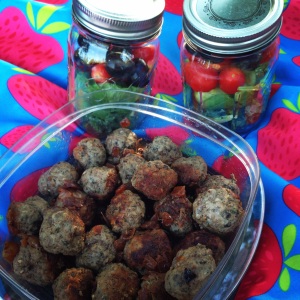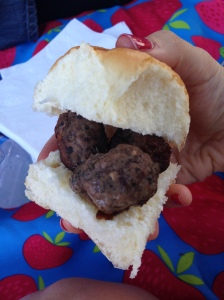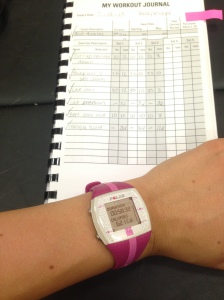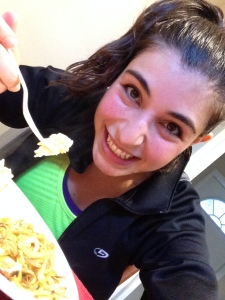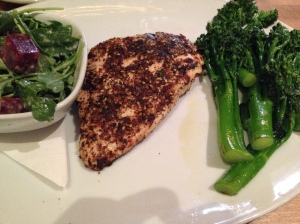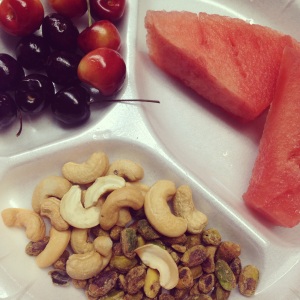Yes, you read that right! Merely just having breakfast does not ensure a healthy day. You have to have the RIGHT KIND of breakfast. The right foods, right amounts, and right flavors. When I have a satisfying breakfast that is high in protein, I have more energy throughout the day, less cravings, and am an overall happier person! However, if I have a quick bowl of oats without any fat or protein, a piece of fruit, or just some gluten free toast, I am hungry a few short hours later and am usually fighting off cravings and low energy all day long!
I did some research on this breakfast phenomenon and found a great article on the subject! The article is entitled: "A randomized crossover, pilot studying examining the effects of a normal protein vs. high protein breakfast on food cravings and reward signals in overweight/obese "breakfast skipping" late-adolescen girls."
Phew! Long title! Here is the citation if anyone is interested in looking it up!
Hoertel, Heather A., Matthew J. Will, and Heather J. Leidy. "A randomized crossover, pilot study examining the effects of a normal protein vs. high protein breakfast on food cravings and reward signals in overweight/obese." Nutrition Journal 13.1 (2014): 80.
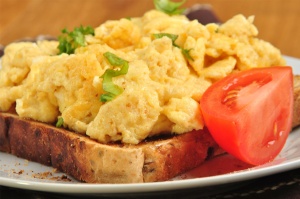
This study was not complicated to understand, but had profound implications on the types of breakfasts we should be consuming, as well as the breakfast foods I should be promoting to my clients and people I educate about nutrition! The study was done on 19-20 year old girls who normally skip breakfast. They were put into three groups: no breakfast, normal protein (NP) breakfast, and high protein (HP) breakfast. The NP breakfast consisted of 13 grams of protein, while the HP breakfast had 35 grams of protein. The subjects were told to continue these breakfasts for 6 consecutive days, then were tested on day 7. They were questioned on their food cravings 4 hours after breakfast. Researchers also collected blood samples from the subjects to test HVA blood concentrations, which is a strong indicator of dopamine's activity in our body.
Wait, what's dopamine? Dopamine is a neurotransmitter in our brain that regulates our pleasure and reward system. Our appetite and food cravings are strongly reward-driven, and it has been found that people with low dopamine levels often suffer from sugar cravings and tendencies to overeat. Dopamine's activity has been seen to be blunted in those who are overweight or obese. Therefore, high dopamine levels indicate less cravings and a greater ability to have a normal appetite and eating pattern.
SO back to the study! After testing these girls in the different groups, the researchers found that those who consumed the NP and HP breakfasts experienced a decline in sweet cravings compared to those who skipped breakfast. However, what was more interesting is that only HP breakfast significantly increased levels of HVA in the blood, indicating an increase in dopamine! This means that these subjects, who were 19-20 year old overweight and obese women, actually were able to increase their dopamine levels and thus, have a greater ability to control their food cravings and appetite.
This is what makes breakfast the most important meal of the day! Not just having it, but also the quality of your breakfast. The fact that these subjects were able to increase their dopamine levels just by having a high protein breakfast has many implications as to what type of breakfast we should be consuming. Most people consume breakfast foods that are obviously not healthy, such as donuts, high sugar coffee drinks, pastries, and drive-through processed meals. However, there are some meals that seem healthy, but don't elicit the same fullness cues and protection against cravings as a high protein breakfast would. These seemingly healthy breakfasts include cereal, bagels, crackers, granola, fruit bowls, or even whole grain toast and bread products. These foods may not be bad or unhealthy, but they still turn into sugar in your body (even if they are labeled "low sugar," carbohydrates turn into sugar in our body, independent of how much sugar is added to these products). So that bowl of cereal will not produce the same fullness as a couple of scrambled eggs and vegetables would. A typical cup of breakfast cereal contains 25-30 g carbs and 2-4 g protein. 30g carbs is the equivalent of about 7 tsp of sugar entering your system, and the 2g of protein is nothing compared to the 35g that was tested in this study!
If this all seems technical to you, let me boil it down to what I believe is a healthy way to approach breakfast. I don't think this study is saying to not have cereal or oats or even bagels. We need carbohydrates, protein, and fat. I think what this research shows is that organizing meals and making sure you have protein, fat, and carbohydrates at each meal is crucial to appetite regulation. There are several ways to go about this while still enjoying your favorite foods:
- 1/2 bagel, hard boiled eggs or egg whites, spinach, and sliced avocado for an open-faced bagel breakfast sandwich! By cutting out half of the bagel, you have room for protein and fat that will help keep you full and send those lovely signals to your brain to not crave sugar later in the day!
-2 scrambled eggs with veggies cooked in olive or coconut oil, 1/2 cup roasted sweet potato. This meal has the right balance of protein, carbs, and fats from all whole food sources, so you can't go wrong!
-1/2 cup cooked oats with nuts sprinkled on top, side of breakfast sausage or eggs
-Big baked egg frittata with bowl of fruit topped with a few nuts
-Protein pancakes or waffles made with whey protein, topped with nut butter
- Leftover protein of any kind with vegetables and avocado (who says breakfast food has to be only "breakfast food?")
The possibilities are endless when you view breakfast, and essentially each meal, as a balance of protein, carbohydrate, and fat. The amount of protein you would need at each meal will vary based on gender, size, activity level, weight, and goals. Experiment and find what works for you! If you have one or two eggs and find yourself hungry an hour or two after, you probably need to add another egg or some sausage to the meal! Try to include vegetables in your meals and snacks whenever possible. These fill us up while still allowing us to eat large volumes of food (and who doesn't like that?)
In conclusion, I think this article shows that having breakfast is an important part of a healthy life. But we need to realize that it isn't just merely having "a" breakfast that makes us healthy. It's having the right breakfast with the right amount of protein that will help keep us full, avoid sugar cravings, and will increase our dopamine production in our brain!
I hope this article was as interesting to you as it was to me! Have a great Thursday everyone!
References:
http://www.psychologytoday.com/basics/dopamine
http://caloriecount.about.com/calories-special-k-red-berries-cereal-i8383







